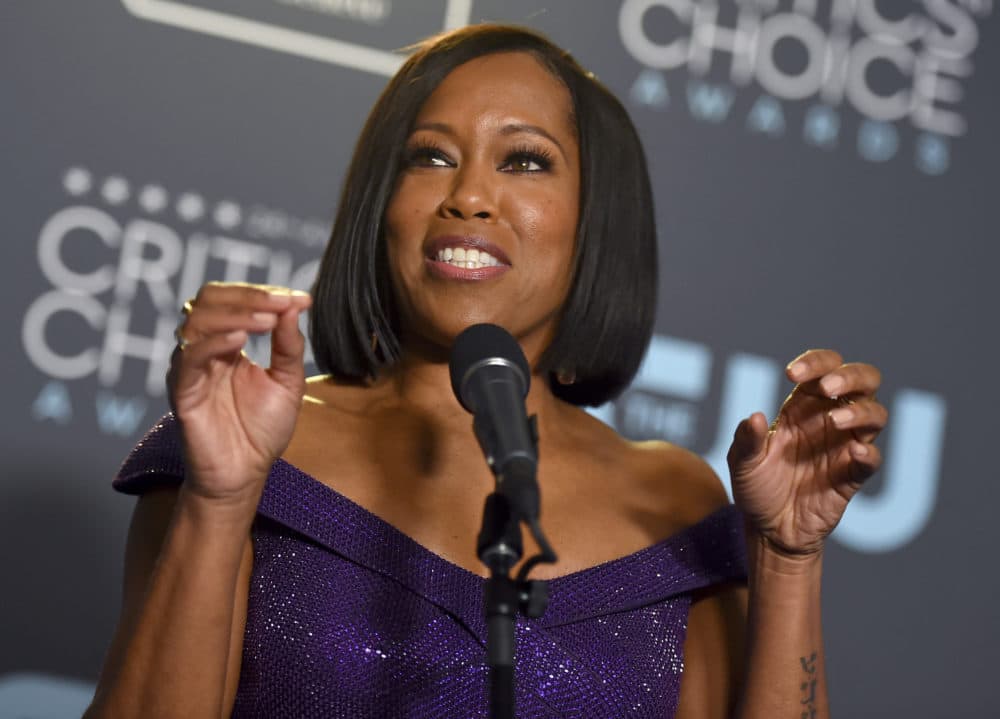Advertisement
Oscar-Nominated Actress Regina King Fights For 'Parity Across The Map'

Regina King’s stunning performance in "If Beale Street Could Talk" has earned her a Golden Globe win and an Oscar nomination. The story, from the James Baldwin novel of the same name — is a tale of sorrow and trusting love. King plays Sharon Rivers, the mother of a pregnant young woman whose boyfriend was falsely accused of rape.
King is also a force to be reckoned with behind the camera, as both a director and producer. From her first acting gig at the age of 13 to today, she says she has not seen enough women in the director’s seat. Now King is sounding the alarm, and challenging the industry to commit to gender equality.
Interview Highlights
On the film "If Beale Street Could Talk" and its message
"I would describe the film as not the typical love story, because it is a representation of love between more than just two lovers. It's love between family members, love between friends, and how that love permeates and how it pushes through traumatic things that happen in life, whether they're ongoing things. Love is finding the way to get on the other side of that trauma."
On the experience she drew on to portray the character of Sharon Rivers
"I drew on personal experiences with my grandmother my mother. My grandmother was definitely the matriarch of our family. She was the woman that, in our church, family friends, always wanted Loretta to be around whenever they were going through anything because she has — my grandmother is not with us anymore, but I speak about her in the present because she's always here, you know, I am her — but she has this presence that is comforting. My mother embodies that same thing. So pulling on just that feeling that I've always felt, as a child, as a mother. Being part of a family that is very supportive. And also just recognizing that it's very rare to see ourselves in cinema or on television where the mother and father is in the home and loving on each other and creating a space for their children to thrive. And that was just so important to me to get that right, to represent that honestly. It was the same for Colman [Domingo], KiKi [Layne], Teyonah [Parris] and Stephan [James], that we we knew we had a responsibility to bring an honest portrayal to the Rivers family."
Advertisement
On adapting the work of James Baldwin
"James Baldwin is just, he has been such an eloquent voice for America. Of course he is a black man and he would write many essays about the systemic injustices that occur against black Americans. But, one of the thing that's so beautiful about him is as he would write and speak with so much fire he has so much love. One of his quotes that I think represents who he is the most, who he was, is he said, 'We can disagree and still love each other. Unless your disagreement is rooted in my oppression, denial of my humanity and right to exist.' And it's interesting that he said that so long ago, but yet we are still in so many different ways — I mean, I don't want to get into politics, but just we still have a problem, understanding the difference between disagreement and oppression. And that's just really frustrating and sad, but I feel blessed to be part of a piece of art that is a representation of how far we haven't come."
"Five minutes into watching this film, I started tearing up, and I was like, 'Oh, my God. What's happening?' And I realized that this film was a visual symphony."
Regina King
On watching the film herself
"Here's the thing: I had planned not to watch, again, as I have not watched myself in something in years. And Dede Gardner, who was one of our producers, she was like, 'You have to see this. You have to see this film. Not even for your performance. You have to see this film.' So I'm like, 'Yeah, you know, you're right. This is Barry Jenkins and James Baldwin. You're right. Remove yourself, Regina, from this. It's not all about you.' And five minutes into watching this film, I started tearing up, and I was like, 'Oh, my God. What's happening?' And I realized that this film was a visual symphony. It's a audio's symphony for your ears, for your eyes, for your heart. Barry just found a way to take James Baldwin's beautiful words and paint such a quiet, lovely picture that draws the audience in. And I was there for it, five minutes in."
On her promise, during the Golden Globes acceptance speech, to include at least 50 percent women on all products she produces
"Challenging people in all industries, not just Hollywood. Because we need to see that parity across the the map, with everything.
"It's actually been amazing how many people want to be a part of that, how many people have been inspired to do a version of the same, how many women who are in certain positions, as far as they're employees. I have one of my friends that, as she said, she watched the show and got so emotional, and it inspired her to start her own company, and no longer be an employee. So that's that's the point. You want to plant a seed in the ground and hopefully you'll nourish it and others will plant more seeds, and eventually you'll have a forest."
Alex Schroeder adapted this interview for the web.